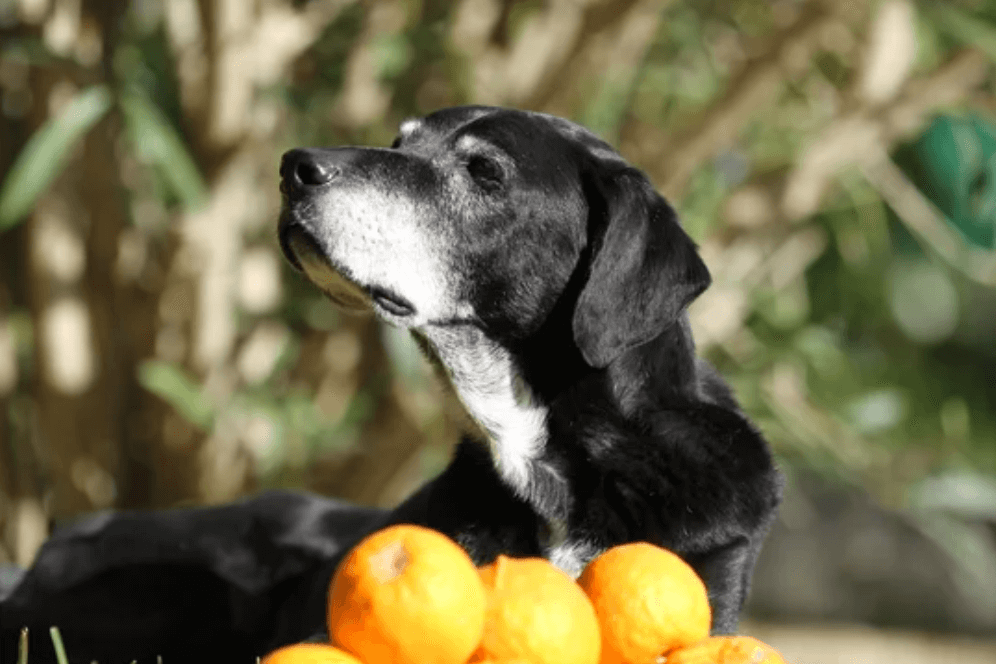Oranges are among the most popular citrus fruits on the planet, and many people have them on a regular basis. But as a responsible dog owner, you might ask yourself if your dog can have oranges just as much as you can.
That is the question we are answering in today’s article. We’re looking at the pros and cons of feeding oranges to your dog, potential health risks, and other alternatives you have in terms of safe fruit for dogs.
Hazards of Too Much Orange for Dogs
Sugar
Feeding fruit to dogs should be done only occasionally and in the form of a treat. This is especially important for senior dogs or those who are overweight.
Some dogs can develop diabetes if they are fed a low-quality diet throughout their life, table scraps, or foods that contain way too much sugar.
If your dog is diabetic or your veterinarian has informed you about the risk of them becoming diabetic, avoid giving them any type of fruit, including oranges.
Potential digestive distress
Due to the sugar and acid in this citrus fruit, oranges have the chance of causing an upset stomach in most dogs. If your pet is an orange aficionado, they might try to bite off more than they can chew.
A whole orange can cause symptoms such as abdominal pain, diarrhea, or vomiting, so make sure you always have complete control over how many slices your dog has.
Contamination with pesticides
Generally, it is a good idea to avoid feeding the peels of fruit and vegetables to pets, and that’s because unless they are organic, the chances of these foods having been exposed to weed killers or pesticides are very high.
Of course, the inside of oranges is safer by comparison, but some of these substances could still have leaked out and contaminated the flesh.
Choking hazards
You should always peel the orange before you give some to your dog, but you should also make sure that you remove the skin and the seeds.
Some pups can get very excited when being fed snacks, so they might wolf down their food without chewing it. In some of these cases, the harder parts of an orange fruit can get lodged into a dog’s throat or just go down the wrong way.
Can Dogs Eat Orange Peels?
The biggest risk that you’re exposing your dog to when you’re giving them the peel along with the flesh of the fruit is an obstruction.
As you can imagine, dogs can have a bit of a hard time digesting some parts of fruits of veggies, including stems and peels.
If the peel acts as a foreign body and blocks your pet’s intestinal transit, surgery might be necessary in order to remove it. Consequently, we recommend against feeding orange peels to your dog.
Do Oranges Have Any Benefits for Dogs?
Oranges do contain some nutrients that might be beneficial to dogs, such as the following:
- Fiber
- Vitamins, especially vitamin C
- Potassium
- Calcium
This fruit also contains low amounts of magnesium and vitamin B6.
Orange fruit flesh is safe to give to dogs as an occasional treat and may provide your pet with these essential nutrients.
Fiber does wonders in improving a pet’s digestion, but you can do the same with safer alternatives such as pumpkin or even sweet potatoes.
Can Dogs Drink Orange Juice?
Even though your dog is probably not going to experience any adverse symptoms if you give them a tablespoon of orange juice, it is not the best thing that this species should drink.
First of all, orange juice does not contain any fiber whatsoever, so it will do nothing to improve your dog’s digestion.
Secondly, if the orange juice is made from concentrate, the procedure might have removed some of the nutritional benefits that your dog might enjoy if you give them the fruit instead.
Finally, orange juice has an extremely high sugar content, so just for that reason, you should avoid it altogether.
Water is the best thing your dog can have for hydration, and you can do yourself a favor and put an oral health additive into it so that your dog’s breath is refreshed and their gums are kept healthy.
Can Puppies Eat Oranges?
Although oranges are relatively safe when compared to other citrus fruits, they are best avoided when it comes to specific vulnerable dog categories such as puppies, pregnant dogs, or seniors.
Puppies should be kept on a healthy, age-appropriate diet at least until the age of 12 months.
Whether you choose a commercial diet that’s free of artificial colors and preservatives or you make your own dog treats at home, the first 12 months (sometimes to 18 months, for some breeds) are essential for ensuring that your pet is a healthy adult.
How to Feed Your Dog Oranges
Wash the orange and remove the peel entirely. Remove all visible seeds and get rid of the skin, too. It is not toxic, but it provides little to no nutritional value, and it’s also harder to digest.
Give your dog only the flesh of the fruit after you’ve cut it into small, bite-sized pieces.
On hot summer days, you can freeze these pieces in an ice cube mold or tray along with some water. This makes for a very refreshing snack.
How Much Orange Fruit is Safe for Dogs?
Given its nutrition and all the risks that we have previously highlighted, oranges should be thought of as dog treats, not as a primary source of food.
As such, one peeled and small-cut slice of orange per week is safe for most dogs.
Do take into account that giant breeds and toy breeds shouldn’t receive the same amount.
Which Citrus Fruits Are Toxic to My Dog?
All citrus fruits that contain high levels of citric acid are a no-go for dogs.
This includes the following:
- Lemons
- Limes
- Grapefruits
Other Safe Citrus Fruits for Dogs
Out of all citrus fruits out there, pomelo, tangerines, and oranges are among the safest to give to dogs.
There are plenty of other safe fruits that you can give your pet, though, even though they’re not in the citrus family. Make sure you remove the peel and seeds of all of these:
- Watermelon
- Apples
- Raspberries
- Bananas
- Mangoes
- Blueberries





